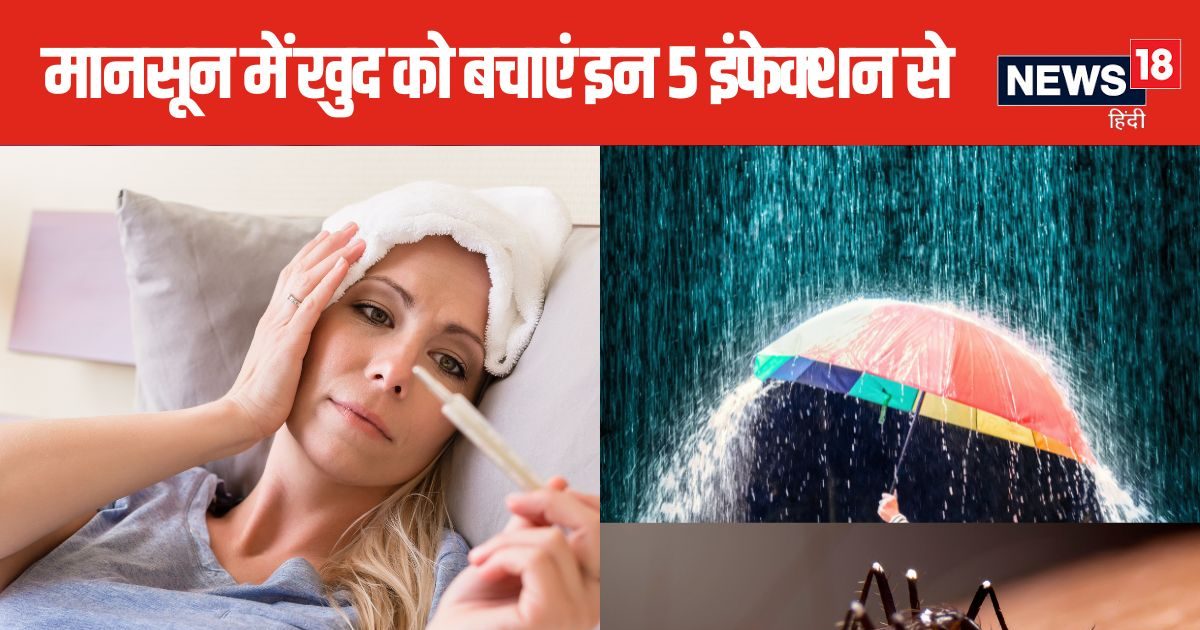Due to monsoon, floods have occurred in many states and people’s lives have been badly affected. Due to rain water getting accumulated at many places, the risk of many types of water-borne diseases, infections etc. increases significantly. Of course you get relief from the scorching heat, but children and old people need to be more cautious about many other diseases during monsoon. The main reason for the increase in all these problems and infections is the favorable climate at this time. Dr. Anita Mathew, Director-General Medicine, Fortis Hospital, Mulund, Mumbai Let us know which diseases and common infections are more likely to occur during monsoon and what are the preventive measures against them.
Malaria
The risk of getting malaria, the most mosquito-borne disease, increases during the rainy season. The parasite Plasmodium reaches human blood when a mosquito bites. There are two common forms of malaria – vivax and falciparum. Sometimes malaria infection becomes so severe that the person suffering from it may even die. Its symptoms include chills, fever with shivering, headache, etc. Usually its fever comes at a fixed time, in which the patient remains fine during the fever. Ways to avoid mosquito bites:
-Wear full-sleeved and long clothes.
-Get fogging done and take care of cleanliness around.
– Do not allow water to accumulate to avoid mosquito breeding grounds.
Dengue
Dengue is also more common among people during the rainy season. This is also a mosquito-borne infection, which is caused by the bite of Aedes mosquitoes. Unlike Anopheles mosquitoes, which are active at night, Aedes mosquitoes are active during the day. Symptoms of dengue include high fever, chills, headache, body ache, etc. The platelet count in the blood of a person suffering from dengue decreases. Dehydration can also occur, due to which many serious problems can start. Fever persists continuously. Dengue mosquitoes breed more in stagnant fresh water, so keep the vessels containing water covered. Keep cleaning the water kept in coolers and vessels from time to time.
Read this also: Mosquitoes will not bite you, if you adopt these 7 foolproof methods, you will also be protected from many diseases in the rain
Leptospirosis
Dr. Anita Mathew says that leptospirosis is a bacterial infection. It is mainly caused by prolonged exposure to dirty water, soil during waterlogging. The bacteria in the water cause filth, which often originates from the excreta of rats, squirrels or dogs. This infection causes severe headache, vomiting, bleeding tendency, decreased urination and in more severe cases, jaundice. This infection can be prevented by the following measures:
– Avoid walking in dirty water.
– Wear boots or shoes that completely cover your feet.
– Wash feet thoroughly with soap and water if they come in contact with dirty water.
– Be sure to consult a doctor for treatment and preventive medicines.
Respiratory Infections
Humidity in the atmosphere increases a lot during the rainy season. There is a possibility of getting virus-borne flu and other respiratory infections. Fever, headache, cold, cough etc. are its common symptoms. People suffering from allergies and asthma need to be more careful, as it can cause more problems in them. The measures to prevent it are as follows:
– Avoid going to crowded places.
– Wear the mask properly on your face.
– Wash your hands and keep sanitizing them.
– Take the flu vaccine once a year. This reduces infections.
Gastrointestinal (stomach and intestines) infection
Most people get stomach and intestinal infections during the rainy season. Sometimes eating unhygienic food outside also causes infection. In such a case, vomiting, diarrhea, jaundice can occur, which depends on the causes of infection. This infection can be caused by dirty, unhygienic, contaminated food, water and flies. It can also be caused by viruses that cause jaundice like hepatitis A and E. Other bacteria like E. coli and typhoid are common among the bacteria that cause this infection. The following measures can be taken to prevent gastrointestinal infection:
– Avoid eating things sold on road side carts.
– Drink water only after boiling it.
– Clean your hands thoroughly before eating.
– Keep food covered at home.
– Keep the surrounding area clean. This reduces the risk of infection.
Tags: dengue fever, eat healthy, Health, Lifestyle, rainy season
FIRST PUBLISHED : July 22, 2024, 08:47 IST
